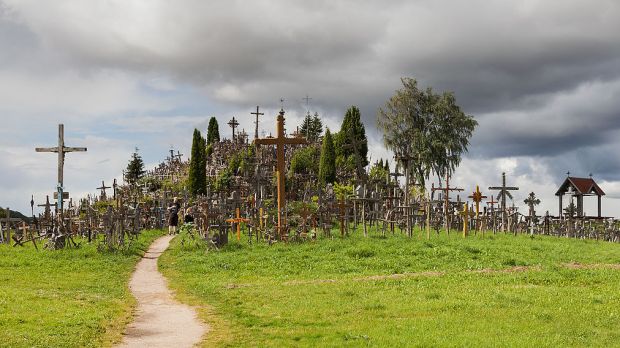Lenten Campaign 2025
This content is free of charge, as are all our articles.
Support us with a donation that is tax-deductible and enable us to continue to reach millions of readers.
Wow. I’d never heard of this before. Via the BBC:
Around 11km outside the city of Siauliai in northern Lithuania, an old, earthen mound hunches under the weight of thousands of crosses. As the wind blows across the fields of rural Siauliai County, ornate rosaries clink against metal and wooden crucifixes, filling the air with eerie chimes. Known as the Hill of Crosses, the mound’s history is a complex narrative of wars and uprisings. Ancient legends, mysterious visions and accounts of haunting surround the hill, and its exact origins remain a mystery to this day. “The hill has many secrets,” said Vilius Puronas, a local artist and historian. “According to folklore, there was once a church where the hill now stands. During a terrible storm, lightning struck the church and the tempest buried it under sand and rock with everyone still inside. Locals say that you can glimpse a ghost procession of monks at the foot of the hill at sunrise. Throughout the ages, magical appearances, visions of saints and sightings of ghosts have been a part of the hill’s history.” Another legend says that in the early 1300s, the hill served as a platform for a wooden castle manned by the pagan barons of Samogitia, once a state in the former Grand Duchy of Lithuania. In 1348, the castle was destroyed by the Order of the Brothers of the Sword, German warrior-monks tasked with the Christianisation of Livonia (what is now Latvia and Estonia). Many believe the Samogitians who survived the battle piled their slain comrades’ bodies together and buried them, thus forming the mound. Like those of the monks, the souls of the fallen pagan warriors are said to still haunt the hill at night. However, the most renowned story of the hill’s creation is the tale of a desperate father whose daughter suddenly fell gravely ill. As the girl lay on her death bed, the father had a vision of a woman who told him to make a wooden cross and place it on a nearby hill; if he did so, she said, his daughter would recover. In the morning, the despairing man hurriedly carved a wooden cross and rushed to the hill. When he returned home, his daughter greeted him at the doorway, perfectly well again. Ever since, people have been leaving crosses in hope their prayers will be answered.
Photo: Wikipedia Commons

